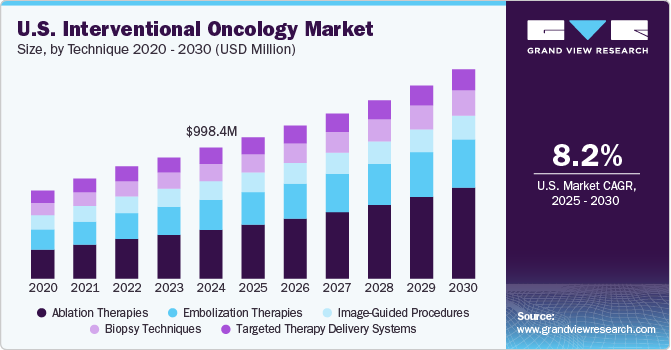-
NEUIGKEITEN
- EXPLORE
-
Seiten
-
Gruppen
-
Veranstaltungen
-
Blogs
U.S. Interventional Oncology Market Driven by Hospital Infrastructure

The U.S. interventional oncology market size was estimated at USD 998.4 million in 2024 and is projected to reach USD 1,597 million by 2030, expanding at a CAGR of 8.17% from 2025 to 2030.
This market growth is primarily driven by the increasing prevalence of cancer, continuous technological advancements in minimally invasive treatments, expanding investments in interventional oncology, and the aging population across the U.S.
A major contributing factor is the rising incidence of cancer in the country. According to the American Cancer Society, approximately 2,041,910 new cancer cases are expected to be diagnosed in the U.S. in 2025, with 618,120 projected cancer-related deaths. As conventional therapies like chemotherapy and radiation often lead to significant side effects, minimally invasive techniques such as radiofrequency ablation and microwave ablation are becoming more popular. These procedures target tumors precisely while minimizing harm to surrounding tissues, which improves patient outcomes and boosts demand for interventional oncology.
Technological advancements are playing a critical role in expanding the market. Innovations are enhancing the precision and effectiveness of interventional procedures. For example, in September 2023, Profound Medical received 510(k) clearance from the U.S. FDA for its TULSA-PRO Thermal Boost module, which enables targeted temperature elevation in specific prostate areas during ablation. This feature has improved treatment efficacy in 88% of prostate cancer cases, demonstrating the growing impact of technology on clinical success and workflow efficiency.
Increased funding and investment from both public and private entities are also accelerating growth. Government grants, research support, and venture capital are fueling innovation in precision oncology and promoting the integration of interventional techniques into standard cancer care. A notable example is the USD 1.5 million in grants awarded in December 2024 by the Society of Interventional Radiology (SIR) Foundation, with two research projects focused on interventional oncology, including genetic subtyping for hepatocellular carcinoma (HCC).
Order a free sample PDF of the U.S. Interventional Oncology Market Intelligence Study, published by Grand View Research.
Key Market Trends & Insights
- By Technique: Ablation therapies dominated the market with a 37.11% revenue share in 2024 and are expected to grow at the fastest rate during the forecast period.
- By Procedure: Vascular interventions accounted for the largest share at 38.18% in 2024.
- By Application: Liver cancer held the largest share at 28.0% in 2024, largely driven by the increasing cases of hepatocellular carcinoma.
- By End Use: Hospitals were the leading end users with a 55.48% share in 2024, owing to the high number of patient visits and demand for specialized cancer care.
Market Size & Forecast
- 2024 Market Size: USD 998.4 million
- 2030 Projected Market Size: USD 1,597 million
- CAGR (2025–2030): 8.17%
Key U.S. Interventional Oncology Company Insights
Prominent players such as Koninklijke Philips N.V. and Siemens Healthineers AG have established strong positions through their advanced imaging technologies. Their emphasis on cost-effective, accessible, and user-friendly solutions has led to broader adoption across healthcare settings.
Notable Companies in the U.S. Interventional Oncology Market:
- Medtronic
- Boston Scientific Corporation
- Johnson & Johnson (Ethicon)
- Cook Medical
- AngioDynamics Inc.
- Stryker
- Terumo Corporation
- Siemens Healthineers (Varian)
- Teleflex Incorporated
- Profound Medical
Browse Horizon Databook for U.S. Interventional Oncology Market Size & Outloo
Conclusion:
The U.S. interventional oncology market is poised for robust growth, driven by rising cancer incidence, technological innovation, and strong investment backing. The increasing preference for minimally invasive treatment options and the strategic efforts of key players are enhancing the availability and effectiveness of advanced oncology solutions. As the healthcare landscape continues to shift toward precision and patient-centered care, interventional oncology is expected to play an increasingly vital role in the future of cancer treatment in the U.S.
- Art
- Causes
- Crafts
- Dance
- Drinks
- Film
- Fitness
- Food
- Spiele
- Gardening
- Health
- Home
- Literature
- Music
- Networking
- Other
- Party
- Religion
- Shopping
- Sports
- Theater
- Wellness


